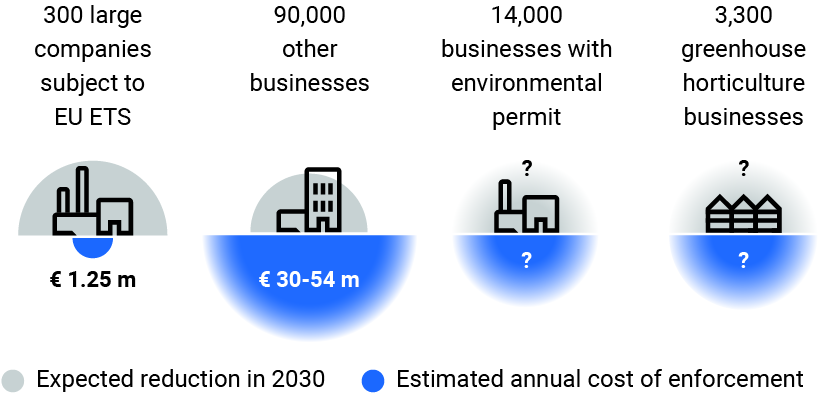Energy saving obligation, 2008-2023
High ambitions, unknown results
Businesses and institutions that are obliged to cut their energy consumption are in all probability saving less energy than the government would like. The Minister of Climate Policy and Green Growth does not know which businesses are obliged to save energy even though the obligation has been in force for 30 years and amended several times. The minister also does not know what results oversight of the obligation has produced.
The Netherlands Court of Audit comes to these conclusions in its audit report, Energy saving obligation, 2008-2023, published on 21 November 2024. In the Court’s opinion, it is implausible that the government has achieved its energy saving ambitions over the past 15 years. Some 90,000 businesses and institutions (schools, churches, clubs) had been subject to the obligation up to 1 July 2023. The target group was then enlarged with a further 17,500 businesses. Our audit found that the minister had no oversight of compliance with the obligation. Municipalities and provinces are responsible for oversight. It is not known how much they spend on oversight and enforcement. Central government provided more than €18 million in 2023. Together with provinces and municipalities, it should provide sufficient funding for the oversight the minister requires: every business should be checked once every 4 years. This would require 22,500 checks a year. In practice, only a few thousand checks are made; the number rose to 9,400 in 2023. At the same time as the Court’s audit, on 21 November the Netherlands Association of Audit Offices published its own report on oversight of the energy saving obligation on behalf of 109 participating municipalities and provinces.
Inefficient approach to oversight
The Court of Audit doubts the efficiency of checking all the businesses concerned. Oversight of large companies subject to the EU Emissions Trading System (EU ETS) is expected to be more efficient at lower cost than oversight of the many small businesses obliged to save energy. The Court of Audit recommends that oversight be organised more efficiently.
Energy saving and oversight cost by business category

Minority of businesses comply in full with obligation
Businesses and institutions are subject to the obligation if their annual electricity consumption is at least 50,000 kWh or their gas consumption is at least 25,000 m3. Only a minority of the 90,000 businesses and institutions subject to the energy saving obligation before 2023 complied with it in full. Industry associations said small businesses in particular found the rules complicated and ambiguous.
The energy saving obligation was introduced in 1993. It is one of the instruments used to meet international climate agreements. If the energy saving ambitions are not achieved, the Netherlands might fail to realise its part of the European targets. Energy savings can also contribute to the CO2 emission reduction target and reduce the Netherlands’ reliance on foreign energy providers.
Audit approach
For this audit, we analysed public information, documents from the Ministry of Economic Affairs and Climate Policy (now the Ministry of Climate Policy and Green Growth), the Ministry of Infrastructure and Water Management, the Ministry of Agriculture, Nature and Fisheries (now the Ministry of Agriculture, Fisheries, Food Security and Nature) and the Ministry of the Interior and Kingdom Affairs. We also held interviews with staff at the ministries and spoke to staff at enforcement services and the target group’s industry associations.
Response of the minister and the Court of Audit’s afterword
The Minister of Climate Policy and Green Growth responded to our conclusions and recommendations. She recognises that insight into the benefits of the energy saving obligation has been limited in recent years. Furthermore, it is uncertain what results oversight has produced. Since the introduction of a duty on businesses to provide information, however, some improvements have been seen. The minister intends to update the duty in 2027.
We briefed the House of Representatives on the audit and held a press conference with the Association of Audit Offices to inform the media on 21 November 2024.
Do you have any feedback on this investigation?
We welcome all feedback on our audits and investigations. What do you think about our report? If you have any questions or need further information, mail us at feedback@rekenkamer.nl. We read all emails carefully and treat them in confidence.